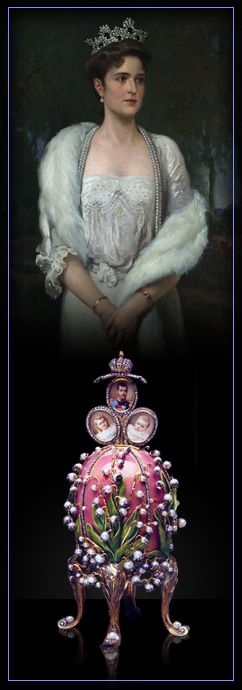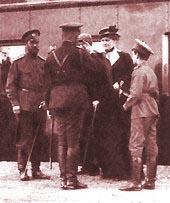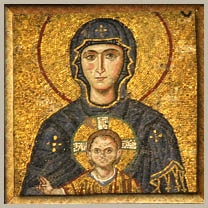A comparison showing how GEDmatch and ancestry.com display there information in different ways and how they interprete your DNA results.


 Chapter XXIIVisits to Headquarters and ElsewhereThe Empress was but rarely seen in Petrograd in the winter of 1915 - 1916. Her health was very uncertain, and she frequently had to interrupt her hospital work at Tsarskoe Selo. Her cherished plan of going to see the work of the Grand Duchess Olga Alexandrovna near the fighting line, and of paying a surprise visit to her ambulance trains, had to be given up. The Grand Duchesses Olga and Tatiana replaced their mother as much as they could. They went every week to Petrograd, the Grand Duchess Tatiana to preside at sittings of her Refugee Committee, and the Grand Duchess Olga to receive donations for her soldiers' families at the Winter Palace. Afterwards the young Grand Duchesses would wind up the afternoon by going to the different hospitals in Petrograd, which the Empress would have seen for herself had she been able. The Grand Duchesses represented their mother at the opening of the British Red Cross Hospital, going with their grandmother, the Dowager-Empress. The Empress had taken the greatest interest in this hospital, and had several conversations with Lady Muriel Paget, Lady Sybil Grey, and Mr. Malcolm, who were responsible for it. It was established in the Grand Duchess Serge's former Palace, then the property of the Grand Duke Dmitri Pavlovich, and was equipped by the British Red Cross and very well run by English doctors and nurses. The Empress was able to pay a visit to the hospital before the unit left for the front. Lady Sybil Grey, who went with them, had the ill-luck, after a very short stay, to be hit in the face by a splinter of shell in the trenches near the firing line. She was sent back to Petrograd, and the wound healed well, but there was considerable anxiety felt for her at one time, and the Empress was full of sympathy. In the spring of 1916 the Empress was able to resume her journeys through the country, though on a smaller scale than in the previous year. These journeys always finished now with a short visit to the Emperor at Mohileff, whither the Tsarevich had also returned, after a time spent at Tsarskoe Selo recovering from his illness. The sun went out of the Empress's life when she was away from the Emperor, and since the Tsarevich's last illness that winter her fears for him were never at rest.  Above: Clockwise: Count Grabbe, Count Freedericsz, Count Shremetiev, Captain Sablin, Grand Duke Dmitri, Nicholas and Alexei having lunch onboard the Imperial Train. The little Tsarevich had "grown up " considerably through being in the Emperor's constant company. He slept in his father's room, for the house at Mohileff was a very small one, and lunched daily with him and his Staff, talking merrily to the Generals and the members of foreign military missions, forgetting his shyness. He was a great favorite with the officers, and the Empress always begged them not to spoil him, which would have been difficult, as he was a delightful boy. The old Belgian General, Baron de Riquel, and the Japanese military representative, who, in common with all his countrymen, was particularly fond of children, were his especial friends. He also made friends at Mohileff with two little boys, the sons of officers' widows in very modest circumstances. The Empress made the acquaintance of their mothers during her visits, and often sent special invitations to the little boys to come and play with her son, as she felt that he wanted companions of his own age. The Empress took her four daughters with her on her journeys, and also to Mohileff, where the whole fan-lily rejoiced in being together. The Grand Duchesses needed a change from their hospital work. The Grand Duchess Olga Nicholaevna, especially, had so much overtired herself in the course of the winter that she had grown nervous and anaemic; had to give up actual nursing and only supervised the wards, though the Grand Duchess Tatiana, still worked in the operating theatre. Large supplies of clothes for refugees were always taken on these journeys, which Tatiana Nicholaevna distributed. For about ten days in the spring of 1916 the Emperor and the Empress travelled together in the south of Russia, the Empress inspecting hospitals and the Emperor reviewing troops. It was a terribly wet time and the Empress and her daughters went about in mackintoshes with well tucked up skirts. They went over Her Majesty's sklad at Vinnitza, a small town near the Roumanian frontier, which had been excellently managed all through the war by Mme. de Hartwig, widow of the former Russian Minister to Serbia. This was the centre of all the Empress's stores and ambulances for the Galician front. Thence they went to Bendery, where the Emperor reviewed the Czecho-Slovak legions, formed from former Austrian prisoners of war, and the beginning of the Czecho-Slovak army ; units of which, while returning to their own country through Siberia, were later on the first to help Admiral Kolchak in his fight against Bolshevism. From Bendery they went to Odessa, where the Empress saw the sanatoria for officers set up in connection with the mud-baths of Odessa, and the first Russian iodine factory. Sebastopol was the next stop. They resisted the temptation to go to Livadia, though the doctors advised it for the Empress. It was, she said, "too great a treat to indulge in during the war." As it was, the trip was a delightful one and did everyone good. The Empress revived, notwithstanding the fatigue, and the Grand Duchesses used to lie like lizards in the sun beside the train at Sebastopol, regardless of their mother's appeals to them to think of their complexions 1 At Sebastopol, where they had so often stopped in former years on their way to Livadia, they felt the spirit of war-time. There were scarcely any men about in the streets, as it was a naval town and they were all with the fleet. At night all the windows of the Imperial train had heavy, black curtains drawn across them. Every light was covered. All the town was plunged into pitch darkness, as German cruisers had entered the Black Sea, and air-raids were feared. The Empress and her daughters accompanied the Emperor as he visited the forts above the town; but they saw the fortifications at some distance, as the Emperor did not attempt to infringe the rule that no women were to be admitted inside the forts. From Sebastopol the journey was continued to Eupatoria, where the Empress had established several sanatoria. Eupatoria was lovely, semi-Oriental, and bathed in sunshine, with glowing flowers overhanging the high white walls of gardens and houses, whose high railed windows proclaimed them to be the residences of Tartars. Eupatoria had not been visited by any Russian Emperor since the Liberal Alexander I, and all the population gave the Imperial Fan-lily a warm welcome. The Mahommedans even authorized the valide (their name for the Empress) and her daughters to attend a solemn thanksgiving service at the mosque, which no woman ever enters. It was quaint to see the tows and tows of prostrate turbaned men, their shoes all standing before the door. Not a word of the service could be understood, of course, except the Emperor's name occasionally. But their earnest faces, and the Oriental calm and discipline with which they all followed the Mullah in his every movement, made an impressive picture. After the Mahommedans, the Karaim Jews' Synagogue was visited. It was a lovely white marble building, covered -with sweet-scented glycinia. A fine tenor chanted the Psalms in Hebrew-it was quite a picture of other centuries and another world. Those were the lighter sides of the visit. The official side including service at the cathedral, and visits to numerous hospitals had come first, and the day was brought to an end by a visit to Mme. Vyrubova, who was undergoing treatment and staying in a seaside villa. Here all the family basked in the sun and forgot their cares for a few brief hours. Months afterwards, this one day in the quiet little town, with its marvellous sun, was remembered and cherished. They had a few hours' relaxation and quiet there, and were very grateful for it. In the summer of 1916 the Empress went several times to Mohileff. The whole party lived in the Imperial train, drawn up in the pine woods near the station. In the morning, while the Empress was resting, her daughters visited the cottages in the neighborhood, played with the children of the peasants, and gave them sweets and presents. All went to luncheon with the Emperor in the house which, to his amusement, was pompously called "the Palace " by the people at Headquarters. It had formerly been the Governor's residence, and bore traces of the progressive bad taste of all the governors who had lived in it. Such hideous stuffs and such terrible imitation oak-grained wallpapers could rarely have been seen together ; but the Emperor had other things to think of, and no changes were made. All the members of foreign missions were invited to these luncheons, as well as the numerous Generals attached to Headquarters and any who came in from the front. The Empress told me that she always felt desperately shy at Headquarters. She had grown unaccustomed to making a big circle and felt that she was out of her clement in such purely masculine surroundings. When she stood in the corner of the room with her daughters, having given her hand to all to be kissed, the bright red spots on her cheeks were sure signs of her nervousness. While the Emperor was engrossed in conversation with some General, she would timidly send one of her daughters to call up someone to her, though she never had the opportunity of talking to some of those whom she would have appreciated most. Her neighbors at luncheon were generally the chiefs of the British and French Military Missions, at first Sir J. Hanbury-Williams and the Marquis de La Guiche, then General Waters and General Janin. She particularly liked Sir J. Hanbury-Williams and talked quite simply to him. He quotes in his book (The Emperor Nicholas II as I knew him) a remark she made to him at one of these luncheons: "War is the passing out of darkness into the light of victory, but victory we must have." This same feeling about victory can be seen in a letter to Princess Louis on December 10, 1915: "Oh, how one longs for 1916 to bring us Allies glorious victories and peace! " Another time the young Grand Duchesses and I nearly fell into a pond from a raft on to which we had climbed to pick some water-lilies for the Empress, and had to be rescued by the Emperor, though he said he had never before provided Her Majesty with flowers under such difficult conditions. The Empress stayed near the cars or by the river during these expeditions, with Mme. Vyrubova, for she could not take long walks now. She liked to talk to passing villagers, and the conversation generally resulted in some private charity to the people who, at first, did not know who she was. After the walk came tea, and then the Emperor had to return to his work. Sometimes people of special interest were invited, officers returning from the front, doctors, etc., and the suite, of course, were Present. After tea, the ladies returned to the train, where the Emperor joined his family for dinner, going back immediately afterwards to his work again. About eleven o'clock tea was served again, in the Russian fashion, when the Emperor would reappear, to read the daily papers and to drink the same number of glasses of tea each evening, while his daughters and the Grand Duke Dmitri Pavlovich, who sometimes spent the evening with their Majesties, kept up a lively conversation together. The Grand Duke teased both mother and daughters, and the Empress was often laughing and talking as gaily as the girls, infected by the buoyant spirits of the young people. Only those members of the suite who were living in the train, and the two gentlemen who had come with the Emperor, were present at that last meal, and the conversation then was generally quite informal, and the Emperor commented on the news he had read. It was said that the whole of Headquarters disliked the arrival of the Empress at Mohileff, as they had an idea that she influenced the Emperor much more than was really the case; and every appointment or every change that occurred after she had been there was laid at her door. This was not so. I myself happen to have witnessed an incident that proves that the dismissal of Sazonov, which has always been attributed to the Empress's influence and most bitterly commented upon, was not brought about by Her Majesty. I was with the Empress in her coupé in the train at Headquarters, when a note from the Emperor was brought in. The Empress read it with signs of the greatest surprise, and, on the spur of the moment, told me its contents. The Emperor wrote that he had decided to dismiss Sazonov. This was news for the Empress, who seemed dubious, and expressed the opinion that she feared the moment was inopportune. The last journey that the Empress took was in December 1916, when she went to Novgorod, a town she had longed to visit on account of its numerous beautiful old churches. Now she had no time to see these, as her visit was mainly to the war hospitals. The Governor escorted her round them, and the nobility gave a large tea party in her honour, but it was clear to those who were with her that there was no warmth in the welcome, though the Empress did not realise it. She managed to see some of the old church treasures, and the cathedral, and she went also with her daughters and the Prince Ioan Constantinovich to see an old Staritza, who was over a hundred years old, and much reverenced in the town. The old woman greeted her with the words: "Here is the martyr Empress Alexandra." Her Majesty seemed not to hear. She received the Staritza's blessing and went away, cheered and comforted; but those who had been with her came back depressed and apprehensive, for they felt the reception was an omen. |
|
Alexandra Feodorovna was the last Romanov Empress of Imperial Russia. This online book - The Life and Tragedy of Alexandra Feororvna was written by Countess Sophie Buxhoeveden, Lady-in-Waiting to the Empress, who served the Empress for many years and followed the Imperial family into exile. |

- Early Surroundings
- Childhood
- A Young Princess
- Engagement
- Marriage
- Her New Home
- Coronation
- Journeys
- Charities and Life
- Queen Victoria
- Foreign Trips
- Birth of Alexis
- Gathering Clouds
- On the Standart
- Rasputin
- Her Family
- Empress at Home
- Last Years of Peace
- Wartime 1914
- War Work
- Without the Emperor
- Visits to Headquarters
- Before the Storm
- Warning Voices
- Rasputin's Murder
- Revolution 1917
- Abdication of the Emperor
- Prisoners
- Five Weary Months
- Tobolsk
- Ekaterinburg 1918


 Left: Alexandra arriving at Stavka greeted by Nicholas and Alexei.
Left: Alexandra arriving at Stavka greeted by Nicholas and Alexei.


